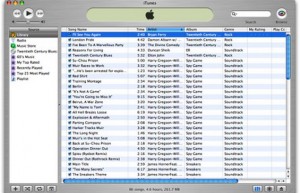 I think the music industry needs a good historian, someone to help give the top executives over at the big record labels some institutional memory and perspective on what’s going on in this new Internet economy.
I think the music industry needs a good historian, someone to help give the top executives over at the big record labels some institutional memory and perspective on what’s going on in this new Internet economy.
Apple’s move this week to restrict the way iTunes 4 users can share their music playlists smacks of music industry insidiousness. An Apple statement released this week said the company made the change — which disables the ability to share play lists over the Internet and limits the feature to local networks — because some were taking advantage of the freedom to "stream music over the Internet to people they do not even know."
So?
This isn’t "file sharing" in its purest form. Morpheus, Kazaa and the Gnutella network are far worse in their blatant disregard for copyright. The streams available through Apple’s Rendezvous technology and iTunes over the Internet, for the most part, can’t easily be recorded to move to a stranger’s computer or iPod.
It’s actually free advertising for the record companies. For most of the recording industry’s life-span, part of its life blood has been the radio stations — and later cable stations like MTV and VH-1 — that got their music and artists exposure. The songs that people liked, they went out and bought the records after they got tired of waiting for the song to show up in a radio station’s rotation.
Internet stream sharing could work to the industry’s advantage for this very reason. Let’s say you get an IP address through the Internet or from a friend for a great playlist available through iTunes and Rendezvous. You browse it and find a couple of songs that you really like and set it up into your iTunes listening rotation. The next time you log on, though, that person’s computer is offline. That music is no longer available to you. Also, if you decided you wanted to use that music in an iDVD project, you couldn’t do it. Want to put it on your iPod so you can listen to it in the car? It’s not going to happen. Finally, a couple of days later, that playlist is again available to you in iTunes when that phantom computer starts sharing again — but you’ve already bought the songs you like at the iTunes music store.
Internet streaming — like traditional and Internet radio stations — can be another vehicle for song exposure. In the long run, it wouldn’t hurt the record companies at all. It would probably boost sales.
Whether it was the recording industry executives who got to Apple, or it was just an inside decision, it was a bad move. Not only is it bad public relations, but it could be bad for business in the long run.
But it will not diminish the iTunes Music Store’s impact, as Apple says in its first month online, it has already dished out 3 million songs.
Besides, if you really want to keep the ability to stream your music via the Internet and get the improvements to AAC audio available in the newer version of iTunes, according to Jim Heid’s Macintosh Digital Hub Site, there is still a way to have them both exist on your hard drive.


No comments
Be the first one to leave a comment.